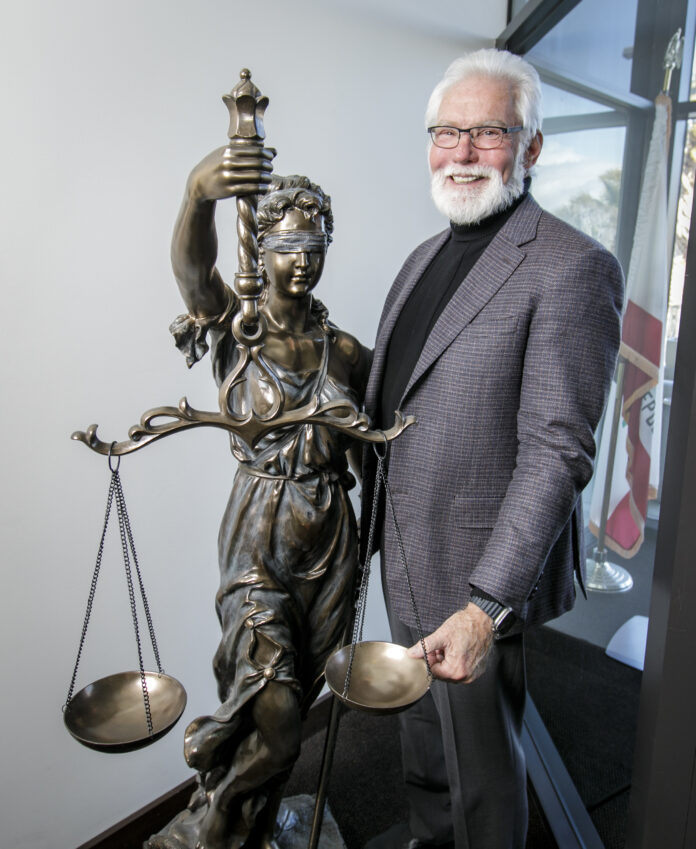In most other markets, they’d probably be among the biggest law firms in town.
But the mid-size and boutique firms throughout the Valley area don’t necessarily have the prestige, manpower or reach of the so-called Big Law firms of downtown and Century City high-rises, which often command multiple floors of office space.
The biggest law firm in the Valley area, Tharpe & Howell, has 50 local lawyers. By contrast, the largest in downtown Los Angeles, Gibson, Dunn & Crutcher, has 297 local lawyers, and Tharpe & Howell would be in a four-way tie for the 69th largest firm. (See the list of largest Valley law firms beginning on Page 12.)
And that’s fine — local firms often lean into a down-to-earth identity.
“There’s always been a sense of ostracism by the established players, which has benefited us tremendously,” said Rex Parris, founder of Lancaster-based Parris Law Firm, adding, “There is a lack of human warmth in those big firms that I insist on here. It makes a difference.”
What the smaller Valley law firms certainly do have is a dedication to their specialized practices and a home base that many attorneys and clients find more appealing.
“It’s not as much about the money as it is the environment,” said Steve Gubner, managing partner of Woodland Hills-based BG Law. “There will always be lawyers and individuals who want to get every dollar they can, and we’re not looking for those people.”
And most importantly, the firms have a track record of success for their myriad clients.
“We still attract clients, a lot of new clients, every year because they hear about what we do and it makes sense to them,” said Richard Lovich, co-managing partner of the Law Offices of Stephenson, Acquisto & Colman in Burbank. “Although we do get new clients all the time, it’s usually based upon word of mouth or references from existing clients.”
Origin stories
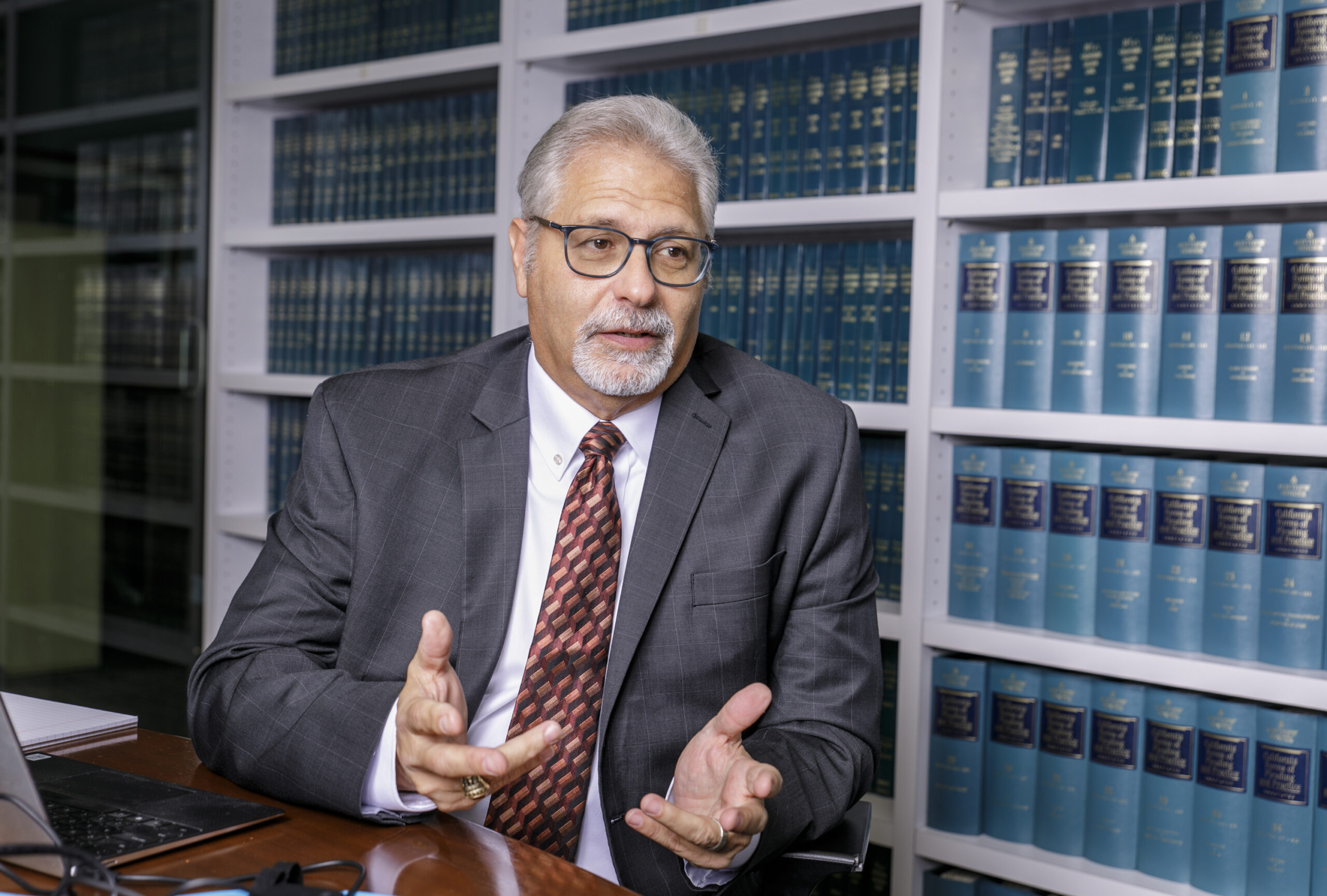
co-managing partner at the Law Offices of Stephenson, Acquisto & Colman, at the firm’s Burbank office. (Photo by David Sprague)
While major law firms, with some exceptions, tend to offer a full range of legal services and practices, mid-size firms tend to center on a handful of specific practices. Boutiques usually build an identity around a singular field or practice.
Gubner, who previously worked at a major firm, called BG Law “a boutique firm that practices like big law.” He co-founded the firm, which also has offices in Las Vegas and Denver, with five attorneys, and grew it to 27 at one point. It now has 16 lawyers in the Valley office.
“As managing partner, I say that I’m the guy at the circus who spins the plates on the sticks. I don’t imagine growing beyond 20 lawyers. I can’t spin that many plates,” Gubner said. “You’ve got to have a management structure that can handle that many bodies, for lack of a better description. We’re happy just the way we are, and it’s hard to do what we do with a much larger platform.”
What it does is mostly business-solvency matters — the ability for a company to handle its long-term financial obligations — and insurance coverage litigation, though it also has a significant practice related to the garment industry. It handles transactions that are in the eight- or nine-figure ballpark.
Stephenson, Acquisto and Colman — often abbreviated as SAC — has a highly specialized practice. The firm’s only clients are health care providers, and all of their cases have to do with disputes on what insurance providers owe those entities.
“We’re probably the only firm that actually focuses on that aspect of it, certainly in California,” Lovich said. “We’re in about 23 other states, and we’ve found that the prevalent presence of law firms in that activity ends with the denial of the appeal in the prelitigation standpoint. Most of the law firms that are involved in what we do do not actually litigate these claims, so that kind of sets us apart from law firms nationally.”
Based in Burbank, SAC also has offices in Carlsbad, Pleasanton, and Chicago. Not confined to just its offices, the firm practices in 23 states, also advising hospitals and other providers on best practices and contracts they’re enacting with insurance companies and public services like Medicare.
“Oftentimes, hospitals are aided by our perspective in that we litigate the contracts on an ongoing basis,” Lovich said, “so the language they rely upon, we can tell them how arbitrators and judges are interpreting them and how they can perhaps shape their negotiations with payers going forward.”
Parris Law Firm, a personal injury practice with 16 lawyers, is the largest firm in the Antelope Valley in terms of attorney count. It’s a far cry from when Parris started the firm in 1986 amidst a sea of other similar practices.
“It was just my wife and me. She was the secretary and I was the lawyer,” Parris recalled. “We borrowed every dime we could to buy a computer. We just slugged it out. It was difficult in those days.”
The pair have something to show for it. The firm now boasts around 100 total employees, uses a large former furniture store as an office and, at six, holds the state record for longest string of consecutive eight-figure verdicts. Parris — the rare Republican among personal injury plaintiffs’ attorneys, he says — also has been Lancaster’s mayor since 2008.
Having been raised in Lancaster, Parris returned to start his practice after working at another firm in Bakersfield for six years.
“When I came to town, it was extremely competitive. They were all really small firms. The biggest one had nine lawyers. It was a different time,” he said, recalling the indignance he provoked by taking out an ad. “We worked our ass off and we didn’t really socialize much. We just wanted to beat them. So we did.”
Location, location …
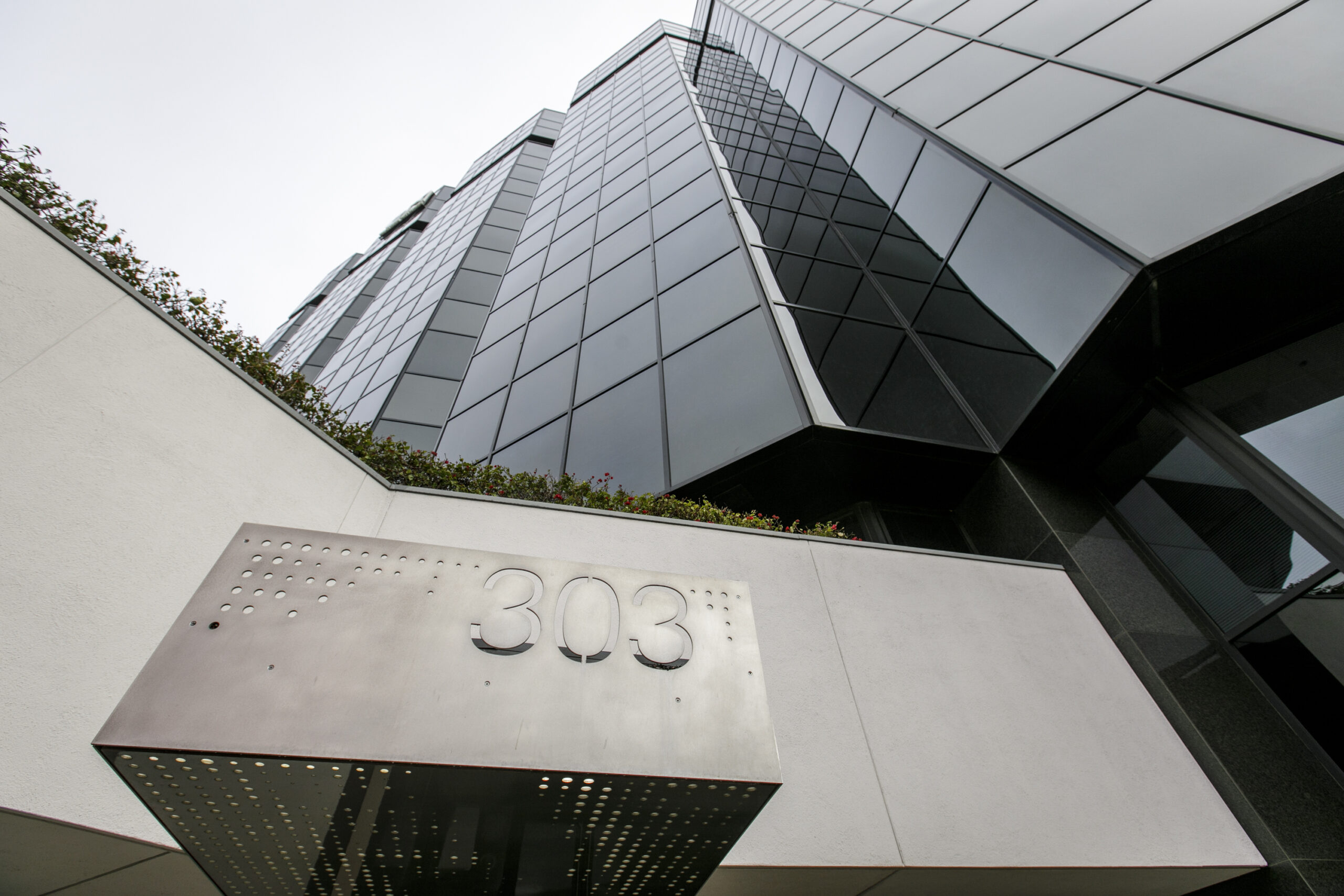
Retaining some of the defiance he adopted when starting off, Parris takes a somewhat iconoclastic attitude to dedicating his career to the Antelope Valley.
“In many respects, I think not being down in the Valley or (downtown) L.A. was really to our advantage. I think many of those lawyers fall into this trap of measuring themselves against each other, so we really only measured against ourselves,” he explained. “There’s a lot to be said when you’re not in the mix, when you’re not comparing yourself to others, because it really brings you down. The lawyers in L.A., especially the personal injury lawyers, I’ve never really had a desire to join them. They’re just different — nice people, but different.
“I’m 71 now,” Parris added, “and when I look back on it, I think there was a lot to be said to not be a part of that group. I think it made a huge difference.”
Setting up shop in Burbank proved to be an ideal location for SAC for several reasons, Lovich said.
“I just love having Burbank as our main hub, if you will. It’s centrally located, so when we have to appear in court, downtown is just a hop, skip and a jump off the freeway. If you have to go out to Santa Monica, the freeway’s out there as well” he said. “We certainly built our practice on being convenient to the courts. That’s one of the main reasons why we’re here.
“Plus,” Lovich added, “there’s a thriving health care presence in the Valley and in Burbank. In building your business, it’s great to pick up the phone and keep in touch with people, but nothing beats face-to-face.”
The area can also serve as a lure to attorneys who aren’t jazzed about the idea of commuting to and from downtown or the Westside to go to the office, especially as more firms are encouraging or suggesting minimum office days as Covid pandemic-related policies wane.
“Instead of driving downtown every day and every other street being a one-way street and dealing with that nonsense, working in a city like Burbank is just such a pleasure,” Lovich said. “Although there’s a lot of stuff going on, it’s just so much easier to get here and be here. If you’re working late, you’re literally steps from downtown Burbank with the movie theaters and restaurants and things like that.”
Gubner had a similar attitude about calling the Valley home, citing the allure of quieter suburban communities that make it easier to settle down and raise a family — most of BG Law’s attorneys and other employees live within 15 miles of the Woodland Hills office, he said. It also helps, he added, to not have the 405 Freeway be a necessary part of work like it was at his prior law firm.
“When I used to have to go downtown for court, it was a crapshoot. A lot of our people really appreciate the fact that they can walk out of the house and be home in 10 minutes,” Gubner said. “The Valley still offers a lot of great home and community opportunities for everybody, whether they have kids or not. It’s sort of grown as a destination point.
“It’s much easier to be happier where you work when you don’t have to drive an hour and a half for work,” he added.
Retaining talent
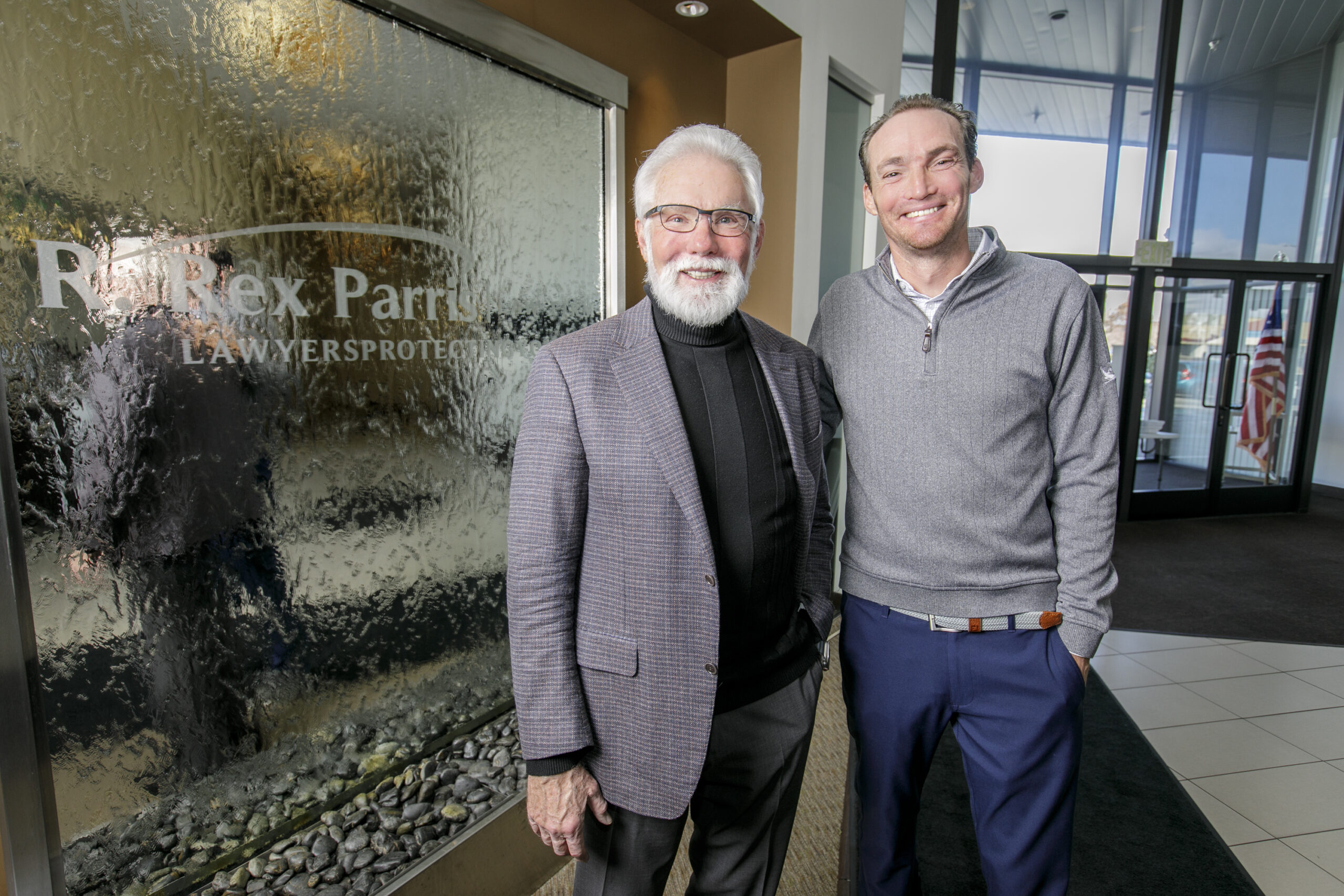
It’s routine for larger, firms to announce new lateral hires, which are used in some part to fill vacancies.
It can be a bigger deal for smaller firms to announce a new hire, because very often that’s a name that will be around for the long haul.
“For our specific type of practice, it’s very, very exclusive. There honestly is not a firm out there that does what we do other than those who go up against the payers on the other side,” Lovich said. “It’s a very exclusive group of firms, and once you’ve got an expertise in this regard, although it does carry over into other areas of law, your value really stays in this particular area because it’s such a narrow area of expertise.”
As Gubner mentioned, its convenient location makes BG Law desirable for a long-term career stop. A strong office culture and book of business that punches above its weight serves as another incentive to stick around, he said.
Ultimately, a smaller, tight-knit team can have stronger camaraderie in the workplace, Gubner opined.
“With Covid, everyone faced an issue with working remotely. We thought forward and we were completely online and paperless, so for us to go remote was very easy. We were able to morph the practice into an online practice for Covid,” he said. “Now that Covid is down, we want to get back. We want to get back to being in the office. Law firms require a collegial nature. They require camaraderie. They require the ability to work with each other on a very inclusive basis, and it’s very difficult to do that on a computer screen.”
Parris has built his practice by seeking quality laterals, and also by bringing in young lawyers fresh to the industry.
“I’ve hired a few really good defense lawyers who can take the meanest depositions possible. When they come over from the defense side to here, they can make millionsimmediately,” he said. “Those people we recruit and bring in, but the rest of them, we bring right out of law school. The ones who are here six months tend to stay forever. They’re well qualified when they walk in the door as a first-year lawyer.”
The work
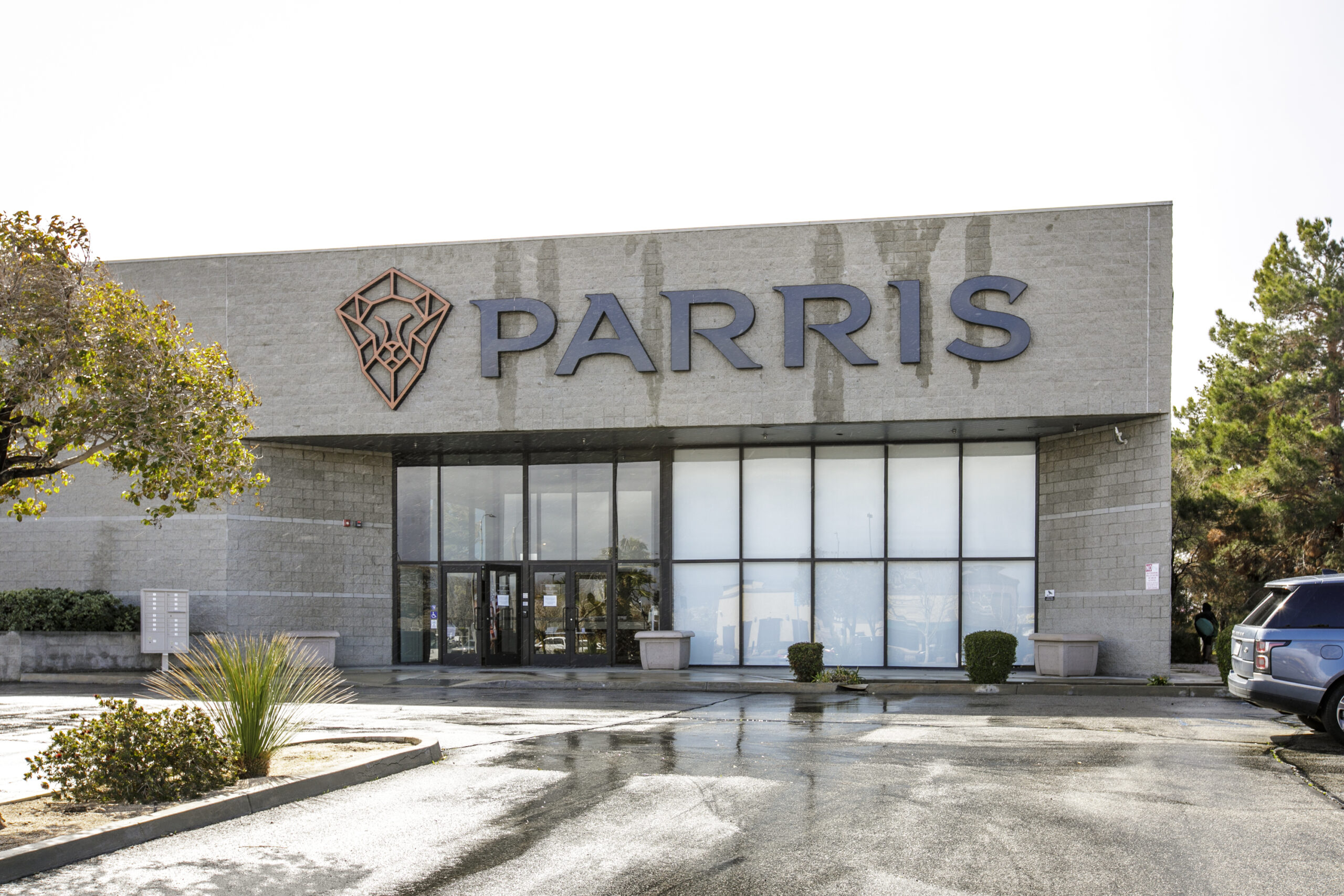
The kind of work matters, too. Lovich previously worked for the insurance companies, which he characterized as lucrative but not especially satisfying. Working on behalf of the medical providers — and by proxy, their patients — is much more fulfilling for him, and probably attracts younger attorneys as well.
“There’s a strong motivation, I think, in the younger attorneys coming up to do public service work, but it’s also very competitive to do that,” Lovich said. “Here, we’re obviously a for-profit organization, but again, representing hospitals and tangentially providing health care to folks is very rewarding, and that appeals to a lot of the younger attorneys.”
Molding young attorneys is something Parris takes to heart.
“When you’re standing in that courtroom, you’re supposed to be scared out of your mind. Other firms don’t let you be afraid, but here, we do,” he said. “These are incredibly qualified people, but they were never taught that they’re going to be afraid and what to do about that, so it chases them all around the courtroom.”
While he was in college, Parris said he experienced a brain injury that made him curious about cognitive science. He has applied what he has learned about cognition and perception to his practice, and it’s how he teaches his colleagues to manage their very natural nerves and fears when in the courtroom.
These skills come in handy as a mayor, Parris admitted, because they go hand in hand with the art — and science, he says — of rhetoric and persuasion.
“I definitely think persuasion is a science. It’s multifaceted, and if you learn one skill at a time, you can definitely do it,” he added. “Anyone can be Bill Clinton. Anyone can be Barack Obama. Anyone can be Donald Trump, too, but I wouldn’t recommend it. All of those guys were trained. Make no mistake about it.”
Gubner agreed that an effective firm culture allows space for associates to learn from mistakes and seek help from a friendly voice.
“Quite frankly, everybody’s going to make a mistake. It’s more about working in a team environment and being smart enough to ask a colleague for assistance,” he said. “If you are on an island in the middle of an ocean, you can probably do that at a big firm, but you’re never really going to be a part of the whole and that’s really what we’re looking for. I think it’s why we have so little attrition. We go out of our way to make sure our people are happy, and they don’t leave.”
Parris added that he feels big firms tend to value metrics like billable hours over actually developing and fostering human beings, and that has informed how he runs his business.
“I’m not interested in how many hours you’re billing. I’m interested in how much you’re learning to go into that courtroom and make a fortune,” he said. “If they’re working 60 hours a week, you’re getting s… work. You cannot work in an intellectual environment like that for 60 hours and get good work.”
Lots of attorneys like Parris strike out on their own early on and make a career out of it, and it’s all they know. Others, like Lovich, have their corporate backgrounds to inform their approach to mid-size and boutique work.
His final take on making that switch?
“I wish I would have started earlier, to be quite honest,” Lovich said.
